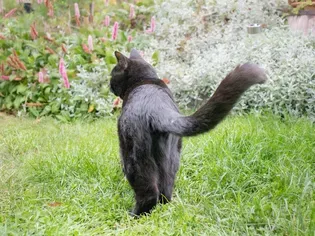What to Do If Your Cat Is Farting
Updated on 05/27/24

What to Do If Your Cat Is Farting
Cats are known for their cleanliness and grooming habits, but even the most well-groomed cat can occasionally have a problem with flatulence. While the occasional fart is nothing to worry about, excessive or smelly flatulence can be a sign of an underlying health condition. If your cat is farting more than usual, or if their farts are particularly smelly, it's important to take them to the vet to rule out any potential health problems.
Causes of Cat Farts
There are a number of different things that can cause a cat to fart. Some of the most common causes include:
* Diet: Cats who eat a diet high in fiber or fat are more likely to have gas. This is because fiber and fat are both difficult to digest, and they can ferment in the intestines, producing gas.
* Swallowing air: Cats who swallow air while eating or drinking can also develop gas. This is more common in cats who eat quickly or who are stressed.
* Medical conditions: Certain medical conditions, such as inflammatory bowel disease and pancreatitis, can also cause gas in cats. If your cat is farting excessively and they are also experiencing other symptoms, such as vomiting, diarrhea, or weight loss, it's important to take them to the vet to rule out any underlying health conditions.
How to Treat Cat Farts
If your cat is farting excessively, there are a few things you can do to help treat the problem.
* Change your cat's diet: If your cat is eating a diet high in fiber or fat, try switching them to a diet that is lower in these ingredients. You can also try adding more water to your cat's food, as this can help to move food through the digestive tract more quickly and reduce gas production.
* Help your cat to avoid swallowing air: If your cat is swallowing air while eating or drinking, try feeding them in a slow feeder bowl or using a water bottle with a small opening. You can also try to reduce your cat's stress levels by providing them with a safe and comfortable environment.
* See your vet: If you have tried the above tips and your cat is still farting excessively, it's important to take them to the vet. Your vet will be able to rule out any underlying health conditions and recommend the best course of treatment.
Preventing Cat Farts
There are a few things you can do to help prevent your cat from farting.
* Feed your cat a healthy diet: A healthy diet is essential for overall cat health, and it can also help to prevent gas. Make sure your cat's diet is high in quality protein and low in fiber and fat.
* Help your cat to avoid swallowing air: If your cat is swallowing air while eating or drinking, try feeding them in a slow feeder bowl or using a water bottle with a small opening. You can also try to reduce your cat's stress levels by providing them with a safe and comfortable environment.
* Take your cat to the vet for regular checkups: Regular vet checkups are important for overall cat health, and they can also help to detect and treat any underlying health conditions that may be causing gas.
When to Worry About Cat Farts
Most of the time, cat farts are nothing to worry about. However, there are a few cases when you should take your cat to the vet. These include:
* If your cat is farting excessively: If your cat is farting more than usual, or if their farts are particularly smelly, it's important to take them to the vet to rule out any underlying health conditions.
* If your cat is farting and also experiencing other symptoms: If your cat is farting and also experiencing other symptoms, such as vomiting, diarrhea, or weight loss, it's important to take them to the vet to rule out any underlying health conditions.
* If your cat's farts are bloody or foul-smelling: If your cat's farts are bloody or foul-smelling, it's important to take them to the vet immediately. These symptoms could be a sign of a serious health condition.
Conclusion
Cat farts are a common problem, but they're usually nothing to worry about. If your cat is farting excessively, or if their farts are particularly smelly, it's important to take them to the vet to rule out any underlying health conditions. In most cases, simple dietary changes or lifestyle modifications can help to resolve the problem.
Explore More Pets

Cat Behavior Problems
How to Stop Aggression in Kittens

Long-Haired Cat Breeds
Siberian Cat: Breed Profile, Characteristics, & Care

Cat Behavior Problems
How to Stop Kittens From Scratching and Biting

Long-Haired Cat Breeds
Turkish Angora: Cat Breed Profile, Characteristics & Care

Basic Training
How to Socialize Your Kitten

Short-Haired Cat Breeds
Cute Pictures & Facts About Calico Cats & Kittens

Litter Box Training
Training Your Kitten to Use the Litter Box

Long-Haired Cat Breeds
10 Fun Facts About White Cats
